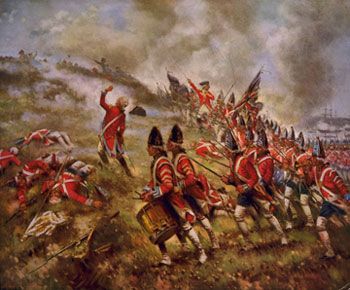The American Revolution, cont.
When fighting broke out in Lexington, Massachusetts in the spring of 1775, whalemen would have preferred to stay out of it. Many were Quakers whose religion forbade making war. Just as importantly, whalemen made a living by selling their fishery products to England. A historian, Obed Macy, noted that whaling communities were "overwhelmed with fearful anticipations" when they learned of the battle in Lexington. Whalemen had reason to be scared. The colonial Navy did not have enough vessels to protect whale ships. This meant that the bulky, relatively slow Yankee whale ships were virtually defenseless against British warships.
Nantucket, the center of colonial whaling, was the fishing community hardest-hit by the Revolution. The residents of this Island off the coast of Cape Cod depended on the trade of whale oil with England. They also relied on goods and supplies shipped to and from the colonial mainland for their survival. Nantucketers never officially took sides in the War. They tried to remain neutral but struggled to convince both sides of their need to continue whaling. Over the course of the seven year war, whaling merchants applied to both British and colonial authorities for special permits to continue their trade without harassment. They were mostly unsuccessful.

Library of Congress E. Percy Moran